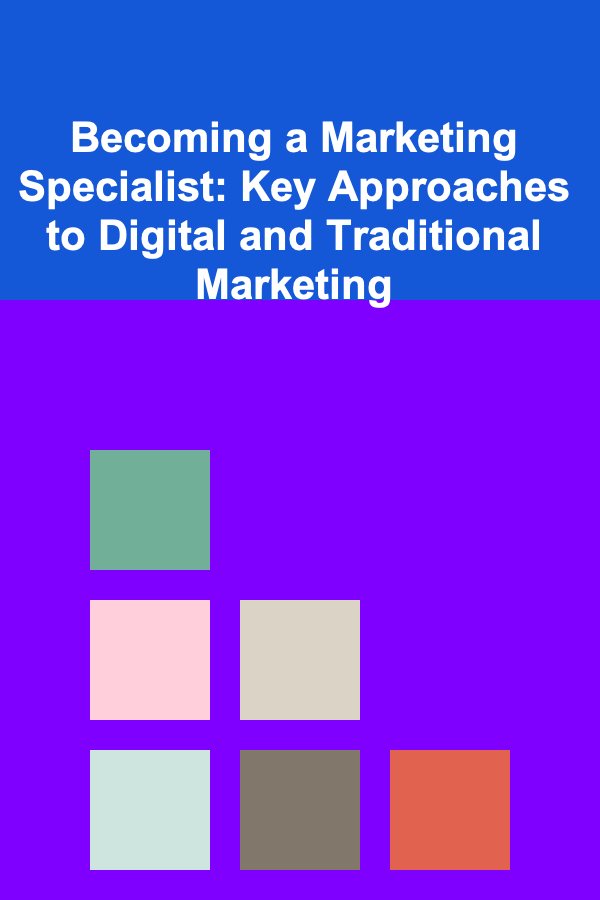
Becoming a Marketing Specialist: Key Approaches to Digital and Traditional Marketing
ebook include PDF & Audio bundle (Micro Guide)
$12.99$10.99
Limited Time Offer! Order within the next:

Becoming a successful marketing specialist requires more than just an understanding of marketing principles. It demands the ability to adapt to evolving trends, a deep understanding of the target audience, and a strong grasp of both traditional and digital marketing techniques. As businesses strive to connect with customers across diverse platforms, a marketing specialist must possess a versatile skill set that spans both traditional and digital marketing channels.
In this guide, we will explore the key approaches, strategies, and techniques that can help you thrive in this dynamic field. Whether you are just starting or looking to enhance your current marketing expertise, this guide will provide actionable insights to build a solid foundation in marketing, including the intersection of digital and traditional methods.
Understanding the Role of a Marketing Specialist
A marketing specialist is responsible for developing and implementing marketing strategies that drive brand awareness, customer acquisition, and retention. The role involves a wide range of activities, including content creation, campaign management, customer research, and performance analysis. Marketing specialists are typically involved in both strategic planning and tactical execution, which requires them to be versatile and data-driven.
Marketing specialists must be able to work across different marketing channels to ensure that messaging and branding are consistent and effective. They also need to be proficient in managing budgets, analyzing data, and optimizing campaigns for better performance.
The role has evolved significantly in recent years, particularly with the rise of digital platforms. While traditional marketing methods like print and broadcast media still play a vital role, digital marketing has taken center stage with the advent of social media, search engine optimization (SEO), content marketing, and email campaigns.
Traditional Marketing: Time-Tested Strategies
Traditional marketing refers to any type of marketing that isn't digital, encompassing strategies like print advertising, direct mail, telemarketing, radio, television ads, and outdoor advertisements such as billboards. While digital marketing has overtaken many aspects of marketing, traditional marketing still holds immense value and should not be overlooked. Here are some key traditional marketing strategies to keep in mind:
Print Advertising
Print advertising remains a powerful tool, particularly for local businesses and targeted demographics. Magazines, newspapers, and brochures are still an excellent way to reach specific audiences who prefer physical media. Additionally, print ads can create more of a lasting impact than digital ones, as people often engage more deeply with print materials.
Tips for Effective Print Advertising:
- Know your audience: Tailor the design and content of your print ads to the specific demographics you are trying to reach.
- Call to action: Always include a clear and compelling call to action (CTA), such as visiting your website, calling your business, or purchasing a product.
- Design matters: Invest in high-quality, visually appealing designs that draw attention and convey the right message.
Direct Mail
Direct mail remains one of the most personal and impactful forms of traditional marketing. Whether through postcards, catalogs, or letters, direct mail offers a tangible connection with the consumer. Unlike email, which can get lost in a crowded inbox, direct mail often leads to higher levels of engagement.
Tips for Effective Direct Mail Campaigns:
- Personalization: Use customer data to personalize mailers, increasing the chances of engagement.
- Track success: Include tracking mechanisms, like personalized URLs (PURLs), so you can measure the effectiveness of your direct mail campaigns.
- Target specific areas: Focus on demographics or geographic areas where your product or service is most relevant.
Television and Radio Advertising
While digital platforms allow for highly targeted ads, television and radio still offer a broad reach, making them ideal for mass marketing efforts. These traditional methods are particularly useful for brand awareness and for reaching audiences that may not be as active online.
Tips for TV and Radio Advertising:
- Compelling visuals and sound: Ensure that your ads are visually and auditorily appealing to captivate the audience.
- Prime time is key: Run ads during peak viewing or listening hours to ensure maximum exposure.
- Stay concise: Keep messages clear, concise, and memorable---less is often more when it comes to TV and radio ads.
Outdoor Advertising (Billboards, Signage)
Outdoor advertising, such as billboards, bus stops, and public transportation ads, continues to be a strong tool for capturing the attention of people in high-traffic areas. These types of ads are ideal for creating awareness and leaving a lasting impression in a public space.
Tips for Effective Outdoor Advertising:
- Location, location, location: Choose high-traffic areas where your target audience is most likely to see the ad.
- Keep it simple: Your message should be brief and easily readable from a distance.
- Incorporate visuals: Use large, bold visuals to capture attention and convey your message quickly.
Digital Marketing: The Modern-Day Powerhouse
Digital marketing has revolutionized the marketing landscape, offering new avenues to reach, engage, and convert potential customers. As technology continues to evolve, digital marketing strategies will remain vital to any business's success. Here are some of the most important digital marketing channels:
Search Engine Optimization (SEO)
SEO is the process of optimizing your website and content to rank higher in search engine results pages (SERPs). By focusing on SEO, you can drive organic (unpaid) traffic to your site, making it one of the most effective and long-lasting digital marketing strategies.
Tips for Effective SEO:
- Keyword research: Identify the search terms and phrases your target audience is using, and optimize your content around those keywords.
- On-page optimization: Ensure that your website is structured for SEO, including optimized meta tags, title tags, headers, and URL structure.
- Quality content: Publish valuable, high-quality content that answers your audience's questions and provides useful information.
Content Marketing
Content marketing focuses on creating and distributing valuable content to attract and engage a target audience. This can include blogs, videos, eBooks, podcasts, infographics, and more. The goal is to build relationships with your audience and position your brand as a thought leader in your industry.
Tips for Effective Content Marketing:
- Know your audience: Create content that resonates with the interests, needs, and pain points of your target audience.
- Focus on storytelling: Use storytelling to make your content more engaging and relatable.
- Consistency is key: Consistently publish fresh, relevant content to keep your audience engaged and your brand top of mind.
Social Media Marketing
Social media marketing leverages platforms like Facebook, Instagram, LinkedIn, Twitter, and TikTok to engage with customers, promote content, and drive conversions. Social media enables businesses to directly interact with their customers, build brand awareness, and even generate leads.
Tips for Effective Social Media Marketing:
- Choose the right platform: Focus on platforms where your target audience is most active. For example, LinkedIn is great for B2B, while Instagram and TikTok are more suited for younger, visually-driven audiences.
- Engage with followers: Respond to comments, answer questions, and interact with your followers to build a loyal community.
- Utilize paid ads: Social media platforms offer powerful advertising tools that allow for precise targeting and budget control.
Email Marketing
Email marketing is one of the most direct ways to engage with your audience. It involves sending tailored emails to your subscriber list with the goal of driving action---whether that's making a purchase, reading a blog post, or signing up for an event.
Tips for Effective Email Marketing:
- Segment your list: Segment your email list based on customer demographics, behavior, or engagement to send targeted, personalized messages.
- Compelling subject lines: Craft subject lines that capture attention and encourage recipients to open your emails.
- Clear call to action: Each email should have a clear, actionable next step for the recipient to take.
Integrating Digital and Traditional Marketing
A key aspect of becoming a successful marketing specialist is understanding how to integrate digital and traditional marketing strategies. Both approaches have their unique advantages, and when used together, they can reinforce each other to create a comprehensive, omnichannel marketing strategy.
Cross-Promote Between Channels
Use traditional marketing channels to promote your digital efforts. For example, include your website URL or social media handles in print ads, radio, or TV commercials to drive traffic online. Conversely, use digital channels to support traditional marketing efforts by offering exclusive discounts or content for those who engage with your physical ads.
Track and Measure Performance Across Channels
To ensure that your marketing efforts are working effectively, it's essential to track and measure the performance of both digital and traditional campaigns. Use tools like Google Analytics for digital marketing and customer surveys or sales data for traditional marketing to assess which channels are delivering the best return on investment (ROI).
Consistent Branding and Messaging
Maintain consistent branding, messaging, and tone across both traditional and digital marketing channels. Whether your audience sees an ad on television or a social media post, they should have a unified brand experience. This creates trust and recognition, which leads to stronger customer loyalty.
Conclusion
Becoming a successful marketing specialist requires mastery over both traditional and digital marketing methods. While digital marketing offers new and exciting opportunities for audience engagement, traditional marketing still holds significant value, especially for creating broad brand awareness. By combining both approaches, marketing specialists can create more robust, omnichannel strategies that resonate with a wider audience.
To excel in the field, you must continuously learn, adapt to new trends, and develop a deep understanding of the ever-changing consumer landscape. Whether you're focused on SEO, social media, print advertising, or TV commercials, mastering these marketing approaches will position you for success in an increasingly competitive and fast-paced industry.
Reading More From Our Other Websites
- [Organization Tip 101] How to Organize Emergency Tools for Quick Access
- [Soap Making Tip 101] Creamy Creations: Crafting Luxurious Milk-Based Soaps at Home
- [Home Space Saving 101] How to Build Your Own Desk with Built-In Storage: A Step-by-Step Guide for Beginners
- [Organization Tip 101] Transform Your Home with These Simple Style and Decor Updates
- [Home Budget 101] How to Reduce Energy Bills: Simple Tips for a More Affordable Home Budget
- [Organization Tip 101] How to Promote Special Items to Draw Interest at Your Yard Sale
- [Tie-Dyeing Tip 101] Best Tie‑Dye Methods for Creating Bold, Abstract Wall Art
- [Skydiving Tip 101] Behind the Lens: A Day in the Life of a Professional Skydiving Photographer
- [Organization Tip 101] How to Choose the Right Whole-House Fan for Your Home
- [Home Budget 101] How to Automate Your Savings for Effortless Budgeting

How to Create a Checklist for Attending a Formal Event
Read More
How to Declutter Your Home with Minimalist Storage Solutions
Read More
How to Evaluate Risk When Making Investment Decisions
Read More
How To Plan for Long-Term Care in Retirement
Read More
10 Unique Printable Board Game Themes You Haven't Seen Before
Read More
10 Tips for Dealing with Difficult Patients as a Pharmacy Technician
Read MoreOther Products

How to Create a Checklist for Attending a Formal Event
Read More
How to Declutter Your Home with Minimalist Storage Solutions
Read More
How to Evaluate Risk When Making Investment Decisions
Read More
How To Plan for Long-Term Care in Retirement
Read More
10 Unique Printable Board Game Themes You Haven't Seen Before
Read More